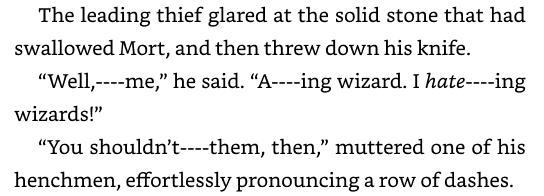A dashing wizard
« previous post |
From Jesse Sheidlower:
I hereby offer to supervise an MA thesis focused entirely on this one passage.
#linguistics
— Jesse Sheidlower (@jessesword.com) July 17, 2025 at 2:02 PM
The cited passage is from Terry Prachett's 1987 novel Mort.
Here's the context:
Three men had appeared behind him, as though extruded from the stonework. They had the heavy, stolid look of those thugs whose appearance in any narrative means that it’s time for the hero to be menaced a bit, although not too much, because it’s also obvious that they’re going to be horribly surprised.
They were leering. They were good at it.
One of them had drawn a knife, which he waved in little circles in the air. He advanced slowly towards Mort, while the other two hung back to provide immoral support.
“Give us the money,” he rasped.
After some back-and-forth:
“I think we kill you and take a chance on the money,” he said. “We don’t want this sort of thing to spread.”
The other two drew their knives.
Mort swallowed. “This could be unwise,” he said.
“Why?”
“Well, I won’t like it, for one.”
“You’re not supposed to like it, you’re supposed to—die,” said the thief, advancing.
“I don’t think I’m due to die,” said Mort, backing away. “I’m sure I would have been told.”
“Yeah,” said the thief, who was getting fed up with this. “Yeah, well, you have been, haven’t you? Great steaming elephant turds!”
Mort had just stepped backwards again. Through a wall.
The leading thief glared at the solid stone that had swallowed Mort, and then threw down his knife.
“Well, —- me,” he said. “A —-ing wizard. I hate —-ing wizards!”
“You shouldn’t —- them, then,” muttered one of his henchmen, effortlessly pronouncing a row of dashes.
The third member of the trio, who was a little slow of thinking, said, “Here, he walked through the wall!”
One quasi-linguistic note, for anyone who takes Jesse up on his offer: I presume that the image in Jesse's skeet comes from a printed book, because the Kindle version (inappropriately) eliminates the spaces corresponding to the boundaries of the bleeped words:
That's a typographical convention that annoys me when it eliminates spaces next to punctuational dashes. In Jesse's image, there are spaces on both sides of all of the dashes, except after the ones preceding "ing". That also strikes me as inappropriate to context — in the text reproduced above, I've added spaces around each bleeped word, but not between the intra-word letter-bleeping dashes.
Another linguistic question is how the readers of the Audible audiobook version render the dashes. However, I'm not willing to spend $23.24 to learn the answer (or even the special Audible-member price of $10.49), since my master's thesis days are long past.
In related news, there's a new-ish edition of The F-Word ….

Victor Mair said,
July 18, 2025 @ 5:10 am
The —-s in Jesse's skeet make me think of a potential fifth panel for this SMBC comic: "Recursive summarization" (7/14/25).
David Morris said,
July 18, 2025 @ 6:42 am
The1980 movie Fame sees one of the students perform at an open mike stand-up comedy venue. The first time he does very well. The second time he does very badly. One of his friends suggests going for a pizza. He says something to the effect of "I died out there and you're talking about fucking *pizza*?". His friend says "No, I'm talking about *eating* pizza".
Philip Taylor said,
July 18, 2025 @ 8:10 am
"the Kindle version (inappropriately) eliminates the spaces corresponding to the boundaries of the bleeped words" — whilst the web version, at least as rendered here in Firefox, ligates the first three dashes to form an em-dash, leading to « "Well, —- me,” he said. ».
Roscoe said,
July 18, 2025 @ 9:12 am
Paraphrased from Isaac Asimov’s “Treasury of Humor”:
A man comes home chuckling. His wife asks him why. He says, “I just heard the dirtiest limerick ever!” She says, " Let me hear it." He says, “No, I can’t. It’s just too dirty.” She says, “O.K., tell you what. You substitute a dash for anything you think I’m too delicate to hear, and I’ll figure it out on my own.” He says,
“Dash-dash-dash-dash-dash-dash-dash-dash,
Dash-dash-dash-dash-dash-dash-dash-dash,
Dash-dash-dash-dash-dash,
Dash-dash-dash-dash-dash,
Dash-dash-dash-dash-dash-dash-dash-fuck.”
David Marjanović said,
July 18, 2025 @ 9:21 am
Worse, it replaces all the dashes by hyphens. – – – – Kindle to – – – –!!!
Roscoe said,
July 18, 2025 @ 10:02 am
Mel Brooks as the Piss Boy in “History of the World, Part I”: “But, dot dot dot, you don’t understand!”